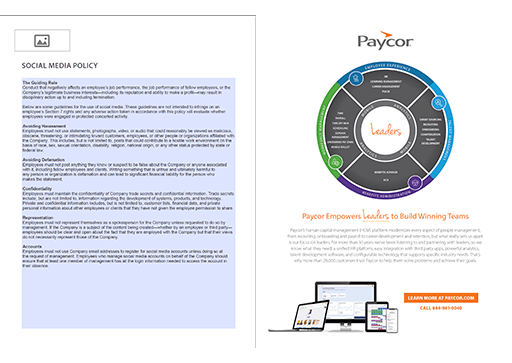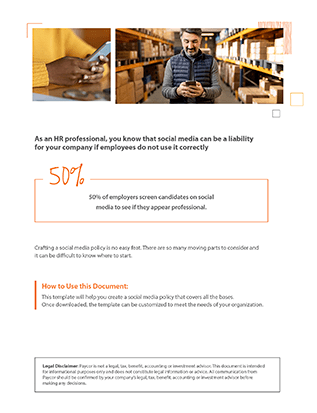One Minute Takeaway
- 18% of employers have fired someone due to social media account
- Social media policies help protect employers from potential legal issues
- When making a policy, include clear consequences in the employee handbook.
Social media is a gift and a curse. When it helps us recruit or market a new product, we love it. But when an employee posts something that draws negative publicity, social media becomes an HR headache. One way to minimize the risk is by having clear guidelines about what types of posts are allowed on Facebook, Twitter, and other platforms.
That’s easier said than done, so we’re here to help. First, we’ll talk about how to create realistic social media guidelines. Then, we’ll share a sample social media policy template that you can use as a jumping off point to write your own version or enhance one you already have.
Why is a Social Media Policy Important?
Unregulated social media can cause a lot of problems for HR. For example:
- Regulatory breaches: Social media posts can contain confidential or proprietary information, including intellectual property.
- Reputational damage: Poorly managed social media campaigns can damage an organization’s reputation. A recent study found that 18% of employers have fired someone due to social media account posts.
- Cybersecurity risks: If the use of social media is unregulated during work time and employees use company computers to access links, your organization could be left vulnerable to cyberattacks.
A clear policy can help organizations mitigate these risks by setting out clear guidelines for how social media sites should be used by employees. It can also help organizations track and respond to any incidents that may occur and it can help protect your organization from potential harm.
Common Rules Organizations Include in Social Media Policies
The goal of a social media policy is to give your employees guardrails. Chances are, they don’t want to break the law or make your company look bad. Here are a few of the most common watchouts to include in your policy:
- Don’t post anything that could be considered confidential information about the company or its clients.
- Don’t post anything that could be considered defamatory or libelous about the company, its employees, or its clients.
- Don’t post anything that could be considered harassment or discrimination.
- Don’t post anything that could be considered obscene.
- Don’t post anything that could be considered a violation of the company’s code of conduct or ethics.
- Don’t post anything that could be considered a threat to the safety or security of the company, its employees, or its clients.
- Don’t post anything that could be considered spam.
- Don’t post anything that could be considered a form of advertising for a competing company.
- Be sure to state that your opinions are not representative of the organization.
What Should a Social Media Policy Contain?
Your policy should be tailored to your company and your employees. However, there are some general guidelines that all social media policies should follow.
- The policy should be clear and easy to understand.
- Employees should be made aware of the policy and what is expected of them.
- The policy must be updated as new technologies and social media platforms emerge.
- The policy should be enforced consistently across all employees.
- Employees should be held accountable for their actions online.
Additionally, you must define what social media is and why it’s important, establish rules for interacting with customers online, and review the policy as needed.
How Do I Create a Social Media Policy For My Employees?
Now that you know why you need a policy, it’s time to create one. The first step is to decide what rules and regulations you want to put in place. This will vary from company to company, but there are some general guidelines that you can follow.
Here are a few things to consider when creating your social media policy:
- What is the purpose of the policy?
- What is considered confidential information?
- What are the consequences of violating the policy?
- How will the policy be enforced?
- Who will be responsible for monitoring social media activity?
When creating your policy, be sure to use clear and concise language. The last thing you want is for your employees to be confused about what is and is not allowed. You can also provide training on the policy so that everyone is aware of what is expected of them.
To ensure that social media policies are being enforced, all employees need to be made aware of them. These should also be inside your employee handbook, and available online as a living document. Social media channels change all of the time, and so will your policy.
Enforcing The Social Media Policy
Once you have your policy in place, it’s important to enforce it.
It may be helpful to have a system for monitoring social media accounts and taking action when someone violates the policy. Consequences should also be clear in your policy, which could mean anything from issuing a warning to terminating employment.
The key is to be consistent in your enforcement so that employees know that you are serious about the policy; and, to avoid any potential lawsuits from employees who feel their rights have been violated if disciplinary action is taken.
The importance of a social media policy cannot be overstated. This document not only provides guidelines and requirements for your organization’s official channels, but it also covers how employees use these platforms both personally or professionally while working at the company. They establish rules for employees on how to behave on social media accounts, and outline what is and isn’t allowed. Additionally, social media policies help protect employers from potential legal issues. By having a policy in place, companies can minimize their risk of being sued for defamation, libel, or slander.
How Paycor Helps
Your employees don’t want to damage their company’s reputation and they definitely don’t want to be terminated over a tweet. HR leaders can help by creating a clearly defined social media policy and then enforcing it consistently and fairly. To get started, we’ve created a sample social media policy.






